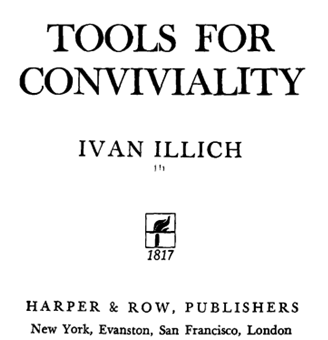By Judith Krauss, University of Sheffield (UK)
What is conviviality as defined by Ivan Illich? How does it link to convivial conservation? And how do both relate to decolonising conservation? These are questions I am grappling with for a new paper, and I summarise them here.
In their recent article ‘Towards convivial conservation’, Bram Büscher and Rob Fletcher, co-leaders of the Belmont Forum/NORFACE-funded CONVIVA – convivial conservation research project, propose a vision for conservation which breaks with pre-existing conservation paradigms around market-based or protection-based ways of thinking. Instead, convivial (‘living with’) conservation aspires to transform conservation towards co-existence, (bio)diversity and social and environmental justice in ways that consider indirect, structural drivers of biodiversity loss while championing grassroots voices. As part of their vision, they propose e.g. a move from protected to promoted areas, from saving to celebrating human and nonhuman nature, from touristic voyeurism to engaged visitation, from spectacular to everyday environmentalisms, and from expert technocracy to common democratic engagement.

Among other sources of inspiration, they build on Ivan Illich’s 1973 book ‘Tools for conviviality’. Ivan Illich’s radical ideas, conceived around the research centre in Cuernavaca, Mexico, which he founded, have sparked conversation in Latin America and far beyond: his ideas around conviviality, deschooling society, work and gender have inspired e.g. computer pioneers to make computers available to ordinary people rather than the technological elite. Zaid (2011) has described Illich’s thinking as genuinely radical in not taking for granted conventional wisdom, but questioning generally accepted tenets of society such as industrialised lifestyles or elite decision-making. Illich’s ideas for conviviality can be summarised as proposing freedom in responsible interdependence: they emphasise participatory decision-making, justice and particularly justice for the most vulnerable as a foundation of a convivial society. Other scholars’ thoughts on conviviality from an environmental angle parallel Illich e.g. in Albó’s (2011) emphasis on interdependence between people and nature through suma qamaña, Naicker’s (2011) application of Ubuntu to the climate change negotiations, or Caillé and colleagues’ convivialist manifesto (2013) emphasising managed conflict.
While it is important to stress that convivial conservation is still evolving, there are some parallels, divergences and question marks when reviewing convivial conservation from the perspective of conviviality as Illich defined it. Parallels emerge around convivial conservation and conviviality’s shared support of radical aspirations. Both equally advocate participatory, democratic engagement in societal decisions rather than elite decision-making.
However, beyond these parallels, some divergences between Illich’s conviviality and convivial conservation also emerge. Illich is very explicit about his support of living within biophysical limits, calling on the rich to stop making murderous demands on the resources of the poor. Neither is explicitly discussed in Büscher and Fletcher’s convivial conservation so far, although they do support degrowth without going into detail on interlinkages. A second divergence is Büscher and Fletcher, commendably, developing concrete proposals for convivial conservation, while Illich remains noticeably silent on tangible suggestions for attaining a convivial society. While this is in keeping with his support for participatory decision-making without external imposition, it also makes implementing his ideas into practice fundamentally challenging. In terms of question marks, one emerges around firstly Illich’s rejection of unlimited progeny: the support for population control, as this can be construed, places Illich in some difficult company, and the ‘convivial’ semantic link may require some clarification by convivial conservation.
A key silence in both Illich’s and Büscher and Fletcher’s convivial thinking concerns gender. Although Illich later wrote a whole book on women’s underappreciated contributions to society, and both convivialities, in their support for inclusive decision-making, implicitly appreciate women and their expertise, a clarification of how women are to play a role in practice would have been welcome. Maybe the most notable silence of both convivialities concerns intergenerational justice: neither addresses the key question of how to organise a society in such a way that not only present, but also young and future generations’ interests and freedoms are taken into account responsibly, a key consideration in the age of human-made climate and other potentially irreversible environmental changes.
Given the intensifying debate on decolonising conservation, it is worth asking to what degree conviviality or convivial conservation could play a role in these efforts. A growing chorus of scholars and activists (e.g. most recently Asiyanbi, 2019; Ogada, 2019; Lang, 2018) are questioning why conservation debates continue to be marred by Northern dominance and racial, ethnic and gendered biases. While my blog and paper may put me at risk of being part of the problem I critique, my motivation in adding my voice to this chorus is, as Lilla Watson and a group of Aboriginal elders put it so aptly, not to “help”, but that my liberation is bound up in everyone else’s.
As alluded to above, convivial conservation and conviviality both aim to prioritise collective decision-making over expert privilege, which offers promise to heed the voices of those historically disadvantaged in and by conservation. Equally, the emphasis on interdependencies in both conviviality and convivial conservation equally challenge Western separations of human and nonhuman nature. Nevertheless, given both convivialities being rooted at least somewhat in the global North, it is important to avoid the risk of continuing conservation’s history of external, Northern or Western impositions under a better-sounding name. Taking seriously convivial ideas e.g. by inviting a range of voices to contribute and devising functioning decision-making processes which incorporate the marginalised could be ways to mitigate that risk.